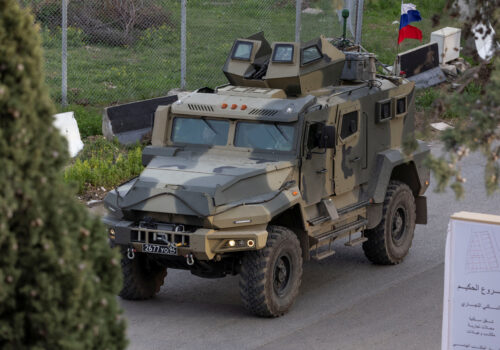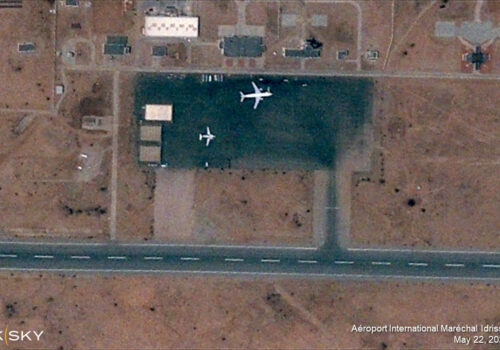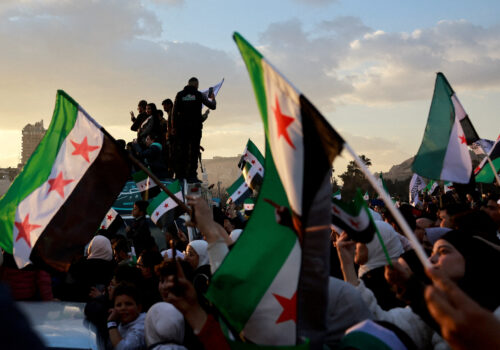Russia is making a fragile pivot from Syria to Libya. The West should beware falling into a new trap.
The fall of Damascus last month marks a shift of historic proportions. Once a centerpiece of Russia’s reassertion on the global stage, Syria now starkly illustrates the fragility of alliances built on coercion and convenience. Bashar al-Assad, propped up for years by Russian airpower, mercenaries, and propaganda, could not withstand the combined weight of internal dissent and external recalibration. For Moscow, this collapse is not merely a setback but an opportunity to adapt—an effort already underway as its forces and equipment pivot southward in the Mediterranean. Russia’s relocation of troops and hardware to eastern Libya signals a strategic recalibration, with Libyan National Army (LNA) Commander Khalifa Haftar waiting in Cyrenaica, hedging his bets. All eyes are on him as Western states court his family members to deter them from enabling a Russian naval pivot in the Mediterranean.
This shifting terrain—from the ruins of Assad’s Damascus to Haftar’s contested Libya—reveals a deeper logic in Russian foreign policy. It is not about replacing one proxy with another but about continuity. Moscow’s operations in Syria were as much about resisting Western encroachment as securing tangible gains. When Russian jets flew from Hmeimim airbase to Libya in 2019 to support Haftar’s Tripoli offensive, it was a quiet rehearsal for today’s broader strategic shift. This ambition in the Mediterranean is not new; it dates back to the eighteenth century, when Russia established its Mediterranean naval fleet to challenge Ottoman dominance and project power. While Moscow’s role in Syria may be evolving rather than disappearing, the shifting dynamics surrounding its use as a launchpad to Africa only underscore Libya’s importance—not as a fallback, but as part of a long-standing strategy to expand Moscow’s strategic foothold in the region and project power beyond it.
SIGN UP FOR THIS WEEK IN THE MIDEAST NEWSLETTER
Parallels between Assad and Haftar run deeper than their shared reliance on Russian patronage. Both are authoritarian figures willing to barter sovereignty for survival. Assad offered Moscow a foothold against NATO’s eastern flank and a stage to test military capabilities. Haftar presents a similar opportunity—a means to disrupt Western interests, exploit Libya’s fractured politics, and extend Moscow’s influence into Africa. Yet both men embody the risks of Russia’s transactional approach. They are less allies than instruments, their perceived strength masking deep vulnerabilities. In Damascus, Assad’s forces crumbled as Moscow’s support wavered. Haftar’s story, though not yet written, carries ominous echoes of the same trajectory.
The West’s neglect during Libya’s transition—marked by US disengagement and conflicting European agendas—enabled Russia (and Turkey) to assert dominance. Despite this, Washington is now playing catch-up, attempting to disentangle Haftar from Moscow’s grip. This strategy betrays a misunderstanding of the dynamics at play, as well as a misconception about Western stakeholders’ ability to replace what Moscow provides to Haftar—military, logistical, and financial support that the West is neither prepared nor equipped to offer. Haftar is no free agent capable of switching allegiances at will, least of all from Moscow, to which he is firmly tethered by his military and logistical dependence. From Wagner Group mercenaries acting as enforcers to counterfeit Libyan dinars printed in Russia financing his campaigns, Haftar’s power is not independent but borrowed, with terms dictated by the Kremlin.
Moscow’s tightening grip
The Kremlin’s view of Haftar as an unreliable paper tiger underscores the asymmetry in their relationship. While Haftar styles himself as Libya’s savior, Russia sees him as a tool for broader ambitions. During Haftar’s US-greenlit ill-fated assault on Tripoli launched in 2019, Wagner operatives eventually withdrew tactically, exposing his forces to chaotic retreats and humiliating losses. The mercenaries’ priority was not Haftar’s victory but securing strategic assets. By cementing a presence in key Libyan bases, Moscow deepened Haftar’s reliance on Russia while consolidating its long-term foothold.
Haftar’s dependence on Moscow reached new levels after his 2020 defeat in Tripoli. Cash-strapped and deprived of momentum, he turned to Wagner’s advanced military capabilities to maintain relevance. Wagner’s MiG fighter jets stationed in Jufra airbase and troops in Ghardabiyah airbase became lifelines for the LNA. The perception of retaining the support of a global power enabled Haftar to reconsolidate his forces, suppressing dissent and enforcing loyalty within its fractious ranks through purges and restructuring. This consolidation paved the way for hereditary succession plans within the Haftar family. Nevertheless, the dependence on Russian support at a period of vulnerability highlights the precarious nature of Haftar’s power, with reliance on foreign support masking fragility.
Haftar’s sons have since cultivated ties with several foreign capitals, including Moscow, leveraging these connections to bolster the family’s standing. This approach mirrors Assad’s dynastic governance and highlights the critical role of external support in sustaining such systems. Centralizing authority within the family aims to solidify power but also disrupts the delicate balance among tribal coalitions and militia alliances underpinning Haftar’s rule. While access to unfettered revenues has thus far preserved co-opted loyalty, the reliance on external backers mirrors the vulnerability that marked Assad’s later years, where growing insularity and dependence on Moscow eroded his broader alliances. The parallels extend to the late Libyan dictator Muammar Gaddafi, whose inner-circle isolation and miscalculations led to mass defections at his regime’s peak. In both cases, perceptions of inevitability gave way to fragility—a cautionary tale for Libya’s current trajectory.
The Haftars’ strategy, while consolidating internal authority, has also deepened reliance on external backers such as Moscow. This dependency grew further in 2023 and 2024, as the Haftar family facilitated the evasion of Western sanctions on Russia by re-exporting Russian refined fuel products falsely labeled as Libyan. This scheme hinged on Haftar’s influence over Libya’s National Oil Corporation (NOC), a sovereign institution eroded by internal divisions and external interference. Working with the Tripoli-based government, the Haftars turned the NOC into a vehicle for factional control and illicit profit. A 2022 US-backed Emirati-mediated deal to replace the NOC’s chief reflected Washington’s flawed assumptions that sharing economic benefits between the Haftars and their counterparts in Tripoli could foster stability. Instead, the agreement enabled Haftar to exploit the NOC for Kremlin-aligned activities and private gain, deepening corruption and exacerbating Libya’s institutional fragility.
More broadly, Moscow’s rising influence over the Haftar family’s operations underscores its role as a key arbiter of its survival as a political dynasty. By controlling critical military assets and logistical networks, Russia wields significant leverage over the LNA’s future. This dependency highlights the paradox of Haftar’s ambitions: consolidating power through familial ties renders him more beholden to Moscow, which can recalibrate its support based on broader strategic interests. In pursuing dynastic continuity, the Haftars have tightened Russia’s grip on Libya, transforming a bid for autonomy into another layer of dependence.
Lessons for the West
The folly of Western engagement with Haftar lies in overestimating his leverage. Washington’s assumption that Haftar can counter Moscow ignores his fundamental reliance on external backers. Even his allies, such as the United Arab Emirates and Egypt, now view him more pragmatically, supporting him only as long as he serves their interests. For Russia, Haftar’s utility stems from dependence, not loyalty. His forces rely on Russian airlifts, the expertise of the rebranded Wagner Group (now operating as the Africa Corps), and Moscow’s soft power. Strip away Russia’s military support, and Haftar’s inflated power on the ground collapses—a mirage reminiscent of the misplaced certainty in Assad’s inevitability.
If the West is to counter Moscow effectively, it must abandon its reactive attempts to “peel away” influential figures from Russia and acknowledge the limits of its influence in a region where it has consistently been outmaneuvered. Instead of chasing fleeting alliances with figures like Haftar, the West should focus on addressing the structural weaknesses that make Libya susceptible to external exploitation. Equally, unconditional support for a weak and corrupt government in Tripoli undermines the country’s sovereignty, creating further voids for actors like Russia to exploit. Strengthening governance, fostering economic resilience, and supporting inclusive political solutions are paramount. In particular, the United States should work with international partners to bolster Libya’s judicial and financial oversight institutions, creating accountability and reducing opportunities for exploitation by foreign actors.
Whether or not Russia succeeds in its Mediterranean pivot, the lesson for the West is clear: playing catch-up in a game already lost serves no one. The failures in both Syria and Libya underscore the dangers of neglecting early intervention and coherent strategy. To avoid repeating these mistakes, the West must learn not only to act decisively but also to prioritize stability over opportunism. This is not merely a regional issue, but emblematic of a broader contest over the principles that will define the global order in the years to come.
Emadeddin Badi is a nonresident senior fellow with the Middle East Programs at the Atlantic Council.
Further reading
Wed, Dec 18, 2024
Will Russia be able to keep its bases in Syria?
MENASource By Mark N. Katz
It would be in the United States’ and Israel’s interests not to give the new Syrian government reasons to let Russia keep those bases.
Tue, Dec 17, 2024
Sudan is caught in a web of external interference. So why is an international response still lacking?
MENASource By Emadeddin Badi
Sudan needs a unified international strategy, combining economic, political, and diplomatic pressure.
Sat, Dec 21, 2024
A US blueprint for Syria’s fragile transition
MENASource By
As long as HTS is willing to evolve and accept constructive criticism, the US should engage with the group. Ignoring Syria’s new leaders will not make them go away.
Image: Libyan military commander Khalifa Haftar gestures as he speaks during Independence Day celebrations in Benghazi, Libya December 24, 2020. REUTERS/Esam Omran Al-Fetori


